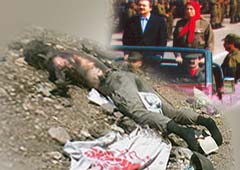On 25 July 1988, in the last days of Iran-Iraq war, after the ceasefire was accepted by Ayatollah Khomeini, the MKO (Mojahedin-e khalq Organization) launched an all-out armed operation against the Islamic republic; despite early breakthrough, it was soon crushed by the military forces loyal to the Islamic Republic.
This operation, called by the MKO "Forough-e Javidan" (Eternal Light) and called "Mersad" (Ambsuh) by Iranian leaders, was the largest armed move by an iranian opposition group which was performed to topple the Islamic Republic government.
Using heavy weaponry (including tanks, armored vehicles) and with thousands of trained members, Mojahedin entered Iran from Iran on July 25, very easily and determinedly. They soon passed the cities of Kermanshah province and captured Sarpol Zahab, Karand, and Western Islamabad and moved towards the city of Kermanshah.
According to the Iranian officials, the early successes by the MKO had created fear among the authorities and they were concerned that Kermanshah might fall soon and that MKO forces move toward the capital.
It seemed that MKO, conceited of developments and the support of the people of the captured cities, moved toward Kermanshah.
Iranian military commanders say they withdrew intentionally in order to blow back later with stronger force.
According to the officials, Revolutionary Guard and Basij forces started their final operation on July 27, when the MKO was only 40 kilometers from the city of Kermansha. MKO forces were crushed heavily.
Revolutionary Guard commanders say that around 1500 armed members of the MKO were killed in the operation and many of them were wounded or captured.
But Iranian officials have not mentioned the number of casualties on their own side.
Now the MKO calls this operation one of its historical achievements!! They called it "Forough Insurance" and said that they imposed a big blow on the pillars of Islamic republic. They also claim that they killed thousands of Iranian forces.
The MKO has never mentioned the real purpose of this operation and it never says whether it was to capture Tehran. So, in MKO’s point of view, this operation has not failed.
But heavy failure and the high number of casualties of MKO made some members and supporters ask questions on the accuracy of decision (by MKO leader) to attack Iran.
A number of high ranking officials of MKO, who later left the MKO, called it a "military suicide" and put the blame on Massoud Rajavi the leader of the organization.
Many of the experts believe that the waning period of MKO, as an armed group, started since that time.
Former members of the organization say that after that time MKO was more dependent on Saddam Hussein.
After the fall of Saddam Hussein by US-led coalition forces, the MKO left its independence more than ever before and after being disarmed by US forces, was limited to its main base near Baghdad (under the US control).
Now, around 3000 MKO members are living in limbo in Iraq, without clear future.

